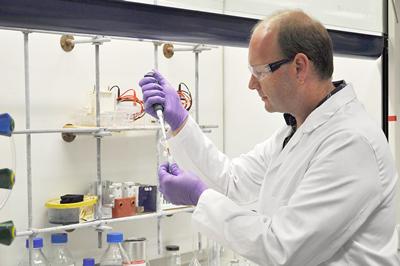Oligonucleotide treatment of genetic diseases targeted in major European research programme

Scientists will train a new generation of researchers to develop tailored oligonucleotides that can help treat cancer and Huntington’s Disease through a €4.1 million European network coordinated by the University of Southampton.
The OLIGOMED (Oligonucleotides for Medical Applications) Innovative Training Network will develop a new platform technology that combines synthetic oligonucleotides (ONs) with smart delivery to help optimise ON therapies.
Dr Eugen Stulz, Associate Professor in Bio-organic and Materials Chemistry, will lead the international research programme over the next four years as it launches 15 diverse PhD and early career research projects.
OLIGOMED unites 12 academic and industrial beneficiaries with four partner organisations across Europe through a major investment from the European Union’s Horizon 2020 programme.
Two early stage researchers (ESRs) will be embedded at the University of Southampton through the programme as it produces highly skilled scientists and future leaders for the rapidly growing field. Two further ESRs will be enrolled at Southampton in a distance learning PhD programme while based in London and in Stockholm.
Oligonucleotides are short single strands of synthetic DNA or RNA that serve as the starting point for many molecular biology and synthetic biology applications. Scientists have established their potential for the treatment of genetic diseases as a promising alternative to gene therapy or small molecules.
Dr Stulz, part of the Chemical Biology, Diagnostics and Therapeutics group, says: “OLIGOMED will explore high-end technologies in a unique academic-clinic-industry combination to develop a novel, versatile ON drug discovery platform. We will use cutting edge chemistry and biotechnology to design and synthesise functional ONs, which – together with suitable delivery vectors – will be used in selected disease models to explore new modes of action and detect new ON biomarkers.”
ON therapeutics, such as antisense ONs (ASOs), are different from conventional medicine as they can regulate the expression of certain genes. Since the landmark discovery of DNA as hereditary material, research has given rise to innovative new ONs that can target specific genes and treat chronic diseases.
The demand for ONs is expected to upsurge as there are currently very few approved ON therapeutics. Many pharmaceutical companies are shifting from in-house platform development to product-specific licensing and co-development to get ON based therapies past clinical trials, which provides an excellent opportunity for Southampton.
Dr Stulz adds: “The most recent developments clearly demonstrate the urgent need for further fundamental research, combined with exploring market viability. In addition, it is already difficult for industry to find people with relevant competence in the expanding nucleic acid chemistry field and the demand is projected to increase even further. It is therefore essential to train more researchers in this field to also provide a recruitment base for industry.”